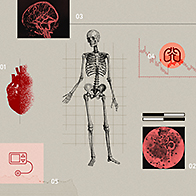Happy 50th! Now Get Screened for Your Overall and Sexual Health

Anyone who has tried to see a doctor recently knows it's a difficult process to navigate. An estimated 32.8 million Americans younger than age 65 lack health insurance in the first place. If you have insurance, choosing a primary care physician who is in the plan's network can be a daunting task. Then when you finally call for an appointment, you might find the doctor is either declining new patients or booked for months. For these reasons, many adults simply go without regular checkups.
But if you're a man who just hit age 50, it's time to make the extra effort to visit a doctor, especially if you fit the male stereotype of waiting until a body part falls off before you seek health care. Even if you're generally in good shape, age 50 is a good time to start receiving recommended screenings, in addition to getting a complete physical examination.
Screenings can benefit your sexual and overall health, because the two are inextricably tied together. For example, erectile dysfunction (ED) can be an early sign of heart disease. Some men may not realize their sexual organs include the prostate gland, which is responsible for producing seminal fluid and whose growth as men age can affect sexual function. Men who have sex with men or with multiple partners have an increased risk of anal cancer.
Screenings are available for all of these facets of your physical health. Doctors recommend several such screenings at age 50 involving the penis and testicles, the prostate, the colon and rectum, and the heart.
Physical exam
A complete physical typically includes an examination and bloodwork, including tests for high blood pressure and cholesterol, obesity and diabetes, all of which can contribute to erectile dysfunction. Other important health topics can be discussed with the patient based on risk factors and age, according to Pauline Yi, M.D., an assistant clinical professor in the Department of Internal Medicine and Pediatrics at the University of California, Los Angeles.
Blood pressure testing should be conducted at least once per year, especially if you are at risk for heart disease and stroke, such as from smoking or diabetes, Yi said. Blood test screenings include cholesterol testing every five years and diabetes testing every three years.
Checking height and weight may seem routine, but body mass index (BMI) is a measure of body fat based on height and weight that can give your doctor an idea of your diet and level of physical activity.
Chris Reid from Kid 'n Play highlights the hilarious health changes 1990s music groups experienced when they reunited on tour. Watch the full interview here.
Penis and testicles
Monitoring your reproductive organs, such as checking for testicular or penile cancer, is largely in your own hands, said Charles Welliver, M.D., director of Men's Health at Albany Medical College in New York, where he is also an associate professor of surgery/urology.
"Penile cancer is incredibly rare in the United States and does not require specific screening," Welliver said. "Any new lumps or bumps on your penis should be assessed by your PCP or possibly a urologist."
Testicular cancer is generally found in men younger than 50, he said. In fact, it's one of the most prevalent types of cancer for men in their 20s and 30s, but that's no reason to neglect your testicles at age 50 and beyond. Monthly testicular self-exams are recommended for men of all ages, Welliver said.
"Take a feel down there in the shower every so often to make sure there are no new lumps or bumps," he said.
By age 50, about half of all men suffer from some form of ED. If you have symptoms of erectile dysfunction, your doctor needs to check for diabetes, according to Yi.
"[ED] is a very common symptom in diabetic patients," she said. "Speak with your physician to ensure there is no other organic or medical reason for the dysfunction."
Additionally, if you're sexually active with multiple partners, get tested regularly for sexually transmitted diseases (STDs) and infections (STIs), including hepatitis B and C.
Prostate
Every man's prostate gland grows naturally with age, and for many men, this growth will lead to benign prostatic hyperplasia (BPH), a noncancerous condition that interferes with urine flow. In most cases, urinary symptoms related to BPH start occurring between ages 50 and 60.
"If you are having symptoms, such as increased frequency, nocturia, hesitancy, weak urine flow, then it would be a good idea to discuss this with your doctor," Yi said.
A doctor can use a digital rectal exam (DRE) or magnetic resonance imaging (MRI) to check the size of the prostate gland. A DRE and a prostate-specific antigen (PSA) blood test are also used to screen for prostate cancer. A DRE checks for lumps or bumps on the prostate gland, while a PSA test reports the levels of a protein produced by both normal and cancerous cells in the prostate. Elevated PSA levels might indicate the presence of cancer.
However, when and whether men should receive prostate cancer screening is controversial and is currently not recommended by the U.S. Preventive Services Task Force for men younger than 55. PSA tests sometimes provide inaccurate results because various factors can raise PSA levels.
Screenings can benefit your sexual and overall health, because the two are inextricably tied together.
The American Urological Association recommends screening for men 55 to 69 years old in good health, Welliver noted. Men who carry a higher risk of prostate cancer, such as those with a family history or of African American descent, may be screened as early as age 50.
"Other [medical] societies have different recommendations, though," Welliver said. "All societies, however, recommend a discussion with your doctor about prostate cancer screening and the possible risks and benefits."
The decision to be screened may depend on the man's background and goals for health care. Screening could be done even before age 50.
"A PSA test in your 40s has value but may not be covered by your insurance," Welliver said. "The rationale for screening in your 40s is you have less BPH [growth] at that time, and the test is potentially more sensitive to cancer risk. I'm in my early 40s and I recently had my PSA done."
Colon and rectum
Colorectal cancer occurs most frequently among people ages 50 and older. Screening is vital because more than 75 percent of cases occur in people with no known risk factors, and colorectal cancer often presents no symptoms.
Colonoscopies are considered the "gold standard" for screening of this disease. Yi recommends a colonoscopy for men at age 50, if not sooner. In 2018, the American Cancer Society lowered the recommended age for first colorectal screening to 45, or earlier if you have a family history of the disease.
"It has been proven to detect disease and save lives," Yi said. "The earlier we find disease, the better the prognosis."
With normal results, a colonoscopy should be repeated every 10 years, but follow your doctor's recommendations.
Other screening options include CT colonography, or virtual colonoscopy, in which a special X-ray is used to examine the colon for polyps or cancer, and sigmoidoscopy, during which the doctor examines only the rectum and part of the colon. At-home screening, such as Cologuard, can detect abnormalities in the stool but does not replace the need for a colonoscopy if blood or cancer cells are found.
Though much less common than colorectal cancer, anal cancer also primarily affects people in their 50s and 60s. Anal cancer differs from colorectal cancer in that most cases are related to human papillomavirus (HPV) infection. Screening involves a DRE and/or an anal Pap test.
Heart
Cholesterol and diabetes screenings are recommended for men at 50 to best determine the risk for heart disease, Yi said. High cholesterol has also been linked to ED, and about half of men with diabetes also experience ED.
Both screenings can be accomplished with blood tests. Blood pressure, body weight, diet and exercise level are also checked during heart-health screenings recommended by the American Heart Association.
Many of these steps start with a routine physical examination. If you recently turned 50 and haven't been to a doctor for some time, it's in your best interest to make an appointment for a physical and any necessary screenings. Most tests are quick and easy to do, and they can provide a world of reassurance about both your overall and sexual health.




















